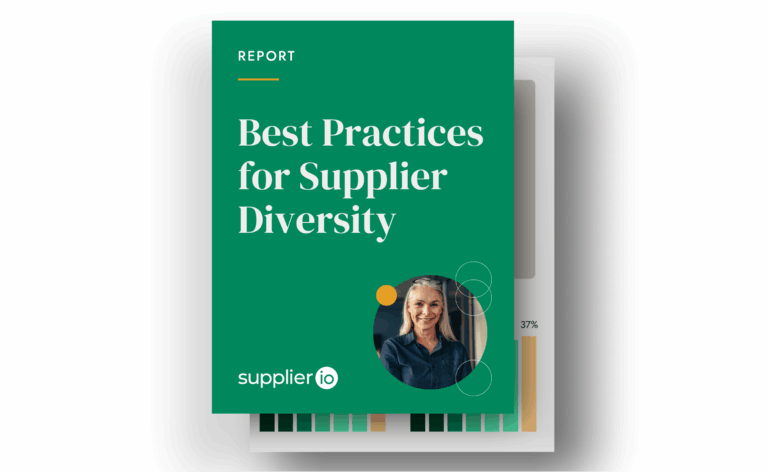Building a Sustainable Supply Chain for Long-Term Success
A sustainable supply chain integrates environmental and social considerations into every aspect of sourcing, production, and distribution.

Meeting ambitious sustainability goals is a top priority for businesses today. Achieving these goals requires not only managing internal operations responsibly but also ensuring that the entire supply chain aligns with environmental and social commitments.
Success depends on comprehensive, reliable data and actionable insights, yet limited visibility into supply chain practices can create significant risks and impede progress toward these objectives.
A sustainable supply chain integrates environmental and social considerations into every aspect of sourcing, production, and distribution. This approach supports responsible procurement, mitigates risks, and fosters trust with stakeholders, ultimately driving long-term value for businesses and their communities.
Why sustainability in supply chains matters
Sustainability in supply chains is essential for businesses seeking to enhance resilience, reduce risks, and drive long-term growth. On the environmental side, reducing carbon emissions, conserving natural resources, minimizing waste, and protecting ecosystems helps businesses meet regulatory requirements, avoid resource-related disruptions, and respond to increasing consumer demand for sustainable practices. Social sustainability is equally integral, encompassing fair labor practices, worker health and safety, human rights protections, supplier diversity, and support for small and local businesses.
These efforts enhance supply chain performance by fostering stronger partnerships, driving innovation, and creating more diverse, flexible, and reliable supplier networks. By integrating both environmental and social practices into their supply chain strategies, businesses achieve sustainability goals that enhance their reputation, meet stakeholder expectations, and secure a competitive edge in a rapidly evolving market.
Benefits of a sustainable supply chain for business
A sustainable supply chain delivers measurable benefits that strengthen business operations, drive innovation, and ensure long-term success. By addressing environmental and social sustainability, businesses can realize the following advantages:
- Risk mitigation: Reducing carbon emissions, conserving resources, and adhering to ethical labor practices minimizes exposure to environmental, operational, and reputational risks. This proactive approach ensures supply chains remain resilient to disruptions and aligned with evolving regulations.
- Streamlined compliance: Sustainable supply chains simplify adherence to environmental and social regulations, making it easier for businesses to meet legal requirements, avoid penalties, and align with global sustainability standards.
- Strengthened supplier relationships: Emphasizing fair labor practices, supplier diversity, and support for small and local businesses fosters trust and collaboration, leading to stronger, more reliable supplier partnerships and a more adaptable supply chain.
- Innovation and efficiency: Sustainability initiatives often lead to the adoption of innovative processes, such as resource-efficient production and waste reduction strategies. These innovations improve operational efficiency, reduce costs, and support long-term business value.
- Enhanced stakeholder confidence: Demonstrating a commitment to environmental and social sustainability reinforces trust among customers, investors, and employees. This credibility positions businesses as industry leaders and strengthens their market reputation.
- Competitive advantage: A sustainable supply chain aligns businesses with increasing consumer and market demand for responsible practices. By integrating these initiatives, companies differentiate themselves and secure a leading position in a rapidly evolving marketplace.
Leveraging supplier intelligence for sustainable supply chains
A truly sustainable supply chain begins with robust supplier intelligence—having a clear, actionable understanding of supplier practices, their sustainability commitments, and opportunities for improvement. Supplier.io’s sustainability solution equips businesses with the tools needed to centralize supplier data, analyze sustainability performance, and make informed sourcing decisions that drive long-term success.
- Enrich supplier profiles: Enhance supplier profiles with certifications and ratings, such as Certified B Corporations, CDP Climate Scores, and Fair Trade. This enriched data provides a deeper understanding of each supplier’s sustainability commitments, enabling more strategic sourcing decisions.
- Access and analyze supplier sustainability data: Access detailed data on supplier practices, including carbon emissions (Scope 1, 2, and 3), science-based targets and carbon intensity metrics. These insights help businesses calculate baselines, identify key areas for improvement, and drive collaborative supplier sustainability initiatives.
- Centralized supplier registration: Streamline the process for suppliers to share their sustainability practices through a centralized portal, simplifying data collection and enabling consistent reporting across the supply chain.
- Alternative sourcing options: Search a vast database of over 7 million suppliers to identify credible, sustainability-aligned alternatives that align with your business goals. This capability supports responsible sourcing and reduces risks tied to over-reliance on specific suppliers.
- Track and report sustainability spend: Gain clear, actionable insights into spending with sustainability-aligned suppliers. Comprehensive tracking allows businesses to measure progress, demonstrate impact, and make informed decisions to align procurement with sustainability goals.
By leveraging supplier intelligence, businesses gain the insights and tools needed to create resilient, sustainable supply chains. These capabilities enable companies to optimize sourcing strategies, improve supplier relationships, and position themselves for long-term success in a market that increasingly values sustainability. When combined with supply chain resilience software, businesses can gain the agility needed to navigate disruptions while advancing their sustainability goals. When combined with supply chain resilience software, businesses can gain the agility needed to navigate disruptions while advancing their sustainability goals.
Building a sustainable future through supply chain practices
A sustainable supply chain is essential for long-term business success, enabling companies to reduce risks, strengthen resilience, and adapt to shifting market demands. By ensuring responsible sourcing and operational efficiency, a sustainable supply chain aligns business practices with sustainability goals, helping organizations stay competitive while driving measurable value.Supplier intelligence from Supplier.io empowers businesses to align their supply chains with sustainability goals by providing critical insights into supplier practices and performance. These tools help businesses make informed decisions that strengthen operations and create value, ensuring their supply chains remain sustainable, efficient, and adaptable for the future.




